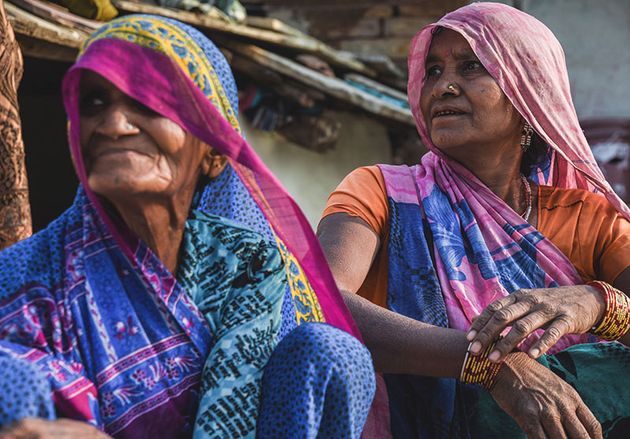The Bhojpuri pattern for church planting among the unreached. An article by Victor John and Dave Coles.
![Photo via [link]Lausanne Movement[/link].](https://cms.evangelicalfocus.com/upload/imagenes/623ad774d01b7_lgaflo.jpg) Photo via [link]Lausanne Movement[/link].
Photo via [link]Lausanne Movement[/link].
About 30 years ago, the Lord stirred in my heart a longing to find a pattern of ministry that would more effectively bring the gospel to the millions of unreached Bhojpuri-speaking people around me, in an area that was then known as ‘the graveyard of missions’.
The Bhojpuri live in the extremely fertile Gangetic Plain of North India, a context marred by the caste system and land disputes. They generally live in extreme poverty and are hostile to outsiders and outside influences.
But the region is also historically rich—Gautama Buddha received his enlightenment and gave his first sermon in this area. Yoga and Jainism both originated here.
After much personal wrestling and transition, I caught a vision and began researching what might be needed. Within a few years, God began working in surprising ways.
The Bhojpuri Church Planting Movement that began in the 1990s has now baptized more than 10 million disciples and has spread and catalysed movements among numerous other unreached groups. [1]
Together with Dave Coles, we share the pattern that we have used to reach the Bhojpuri and other unreached peoples, recognizing the importance for all Christian leaders to see clearly the big picture—whatever that big picture (or ‘vision’ or ‘calling’) might be for them and their ministry contexts.
Our pattern for church planting among unreached peoples begins with research, then moves to relationship, discipleship, and lastly, sustainability.

We encourage people to pray, but what do we hope they will pray for? Specific prayer comes from knowing specific needs, and we identify the needs through research.
We need to gather information and compile it, in order to see the picture more clearly. That builds a pathway leading to the fulfilment of our goal: seeing God’s kingdom increase.
Research requires an attitude of relational openness. We learn by being present—mixing with people and hearing their stories of successes and failures. We do this continually. We do not work based on research somebody did 20 or 50 years ago.
That might give useful background information, but we need to know what has changed since the time of prior research.
We thus equip leaders within the movement to do basic research—an essential ingredient for pioneering and sending people out. We do not sit with a map with all the details written out, but we each know our ministry locations and the people there.
To identify the people’s needs and what the Lord might have us do, we look at factors such as politics, economy, religious practises, and trends in the area where we are working.
We discover who the gatekeepers and influencers are in all those aspects of community life. All these findings give us a very clear picture of the situation so that our ministry can be effective.
India is a relational country, so we focus on relationships. We gain the best inside information based on those relationships.
In our culture, as soon as someone takes out a pen, people shut down. They do not want to say anything if it is going to be written down. A researcher has to understand that. They need the ability to retain information and write it down later. This research then lays the foundation for fresh ministry initiatives and adjustments with prayers.
In the early stages of our work, literacy stood at just 30 percent. We had to figure out how to do effective sustainable work among illiterate people. Many of our believers are eager to learn but cannot read or write, so we started an oral Bible school.
We created a six-month course using picture Bibles, drama, narrative stories, and oral learning approaches. Every participant in this training learned to read the Bible. The Bhojpuri Dramatized Audio New Testament made a tremendous impact in reaching and discipling people.

We do not treat evangelism or discipleship as programs. Our approach to people begins with intentional relationship as a precursor to evangelism, establishing trust and a foundation for heart-to-heart sharing.
That allows people to see why God’s people think differently and act differently from others. Relationship opens the door for proclamation, since gospel sharing is by invitation.
People glimpse something of God’s kingdom and want to know more. That paves the way for leading them to faith. Then we encourage new believers to start sharing their testimony immediately.
So discipleship involves lifestyle from the very beginning. We recommend this kind of discipleship for implementation everywhere.
Five factors have contributed to the sustainability of the Bhojpuri and related movements.
1. We focus on finding and raising up local leadership. We firmly believe that local ownership is essential for the sustainability of the work—and ownership begins with partnership that is sensitive to the Lord’s leading.
We understand that reaching millions of people in every state is a huge task. We cannot accomplish it alone. So we invite other believers and include them as partners in all our programs.
For example, we design each Community Learning Center to strengthen the service of the local partner, not our organization. We delegate responsibility to the local people and hand over leadership positions to them. [2]
2. We develop a culture of empowerment rather than dependency, to safeguard the long-term sustainability of the work. We always aim to take ourselves out of the picture by serving in such a way that the work would not collapse when we are not around.
Jesus did not create dependency—he gave his disciples authority. Jesus is the bridegroom—we are just his friends. The best man helps out until the wedding but he does not go on the honeymoon! People need to depend on Jesus from day one.
3. We focus on equipping leaders among tentmakers and passing on the DNA of the Church Planting Movement. We encourage leaders to be bivocational, to have some trade in accordance with their skills.
Right from the beginning, we eliminate the idea that you get a position and with it, money and all kinds of benefits. If they already have a trade, we encourage them to continue in that as they lead.
A movement cannot depend on salaries and money. A movement has to depend on God and his bivocational leaders.
4. We avoid hierarchy in leadership. In our organization, leadership is functional rather than positional. A leader is a person who leads someone to succeed, in whatever ways possible, so they in turn can lead others.
We avoid the mindset of positional leadership. Our staff members do not use titles like ‘Reverend’ or ‘Pastor’. We just say, ‘You are a leader.’ Our avoidance of titles intimidates some people, but it works. It is both radical and biblical.
5. We constantly mentor new leaders in their own context. We multiply ourselves, instead of keeping the work focused on ourselves and then hoping to pass it on to one other person.
Jesus used this approach—he passed his ministry onto many, not to one. We aim for decentralized multiplication, not building up ourselves as a center of power.
We continually discern how to move the ministry forward, both in breadth and depth. We help disciples grow in Christlikeness while at the same time expanding with fresh outreach.
The Lord calls us to active discipleship and disciple-making—avoiding stagnation but not spreading ourselves so thin that we jeopardize the existing work.
Every believer in our context needs to know about persecution and have a biblical foundation to prepare for the pressure. In our context, persecution does not come from just one source.
It can come from a number of sources: the local community, political leaders, religious leaders, government agencies, and/or businessmen. Many of them function as gatekeepers, holding the key to their community, and they tend to reinforce one another in the persecution of disciples.
Persecution may come in a variety of forms, including (but not limited to) ostracism, mob attacks, jailing, beatings, or intentional destruction of businesses or dwellings.
We do not pray persecution will go away. It pushes us to live a God-centred life and represent the kingdom well. But we also do not look for persecution or invite unnecessary persecution.
The persecution that results from simple obedience to Christ is enough! We do not know how long persecution will last in our context or when and where it may arise in other contexts globally. So we consider it vital that all God’s people be equipped—to stand firm, to live blameless lives (1 Pet 2:20), and to follow Christ’s example in suffering (1 Pet 2:21).[3]

If we expect evangelism and disciple-making to multiply, it needs to happen without expensive patterns or equipment
We need to start with the big picture in mind—the vision and calling the Lord has given to each of our lives and ministries. We all have a role and a place in his Great Commission—the biblical foundation for making disciples of all peoples.
Research brings clarity to our task, its parameters and processes. If we expect evangelism and disciple-making to multiply, it needs to happen without expensive patterns or equipment. If we want a sustainable movement, it cannot depend on resources that a government can stop or control.
And for a movement to endure, its disciples and leaders need spiritual equipping for all kinds of challenges, including persecution. The New Testament shows the way forward in these things. By God’s grace we have seen them applied and bearing fruit in North India, and we commend them to the global body of Christ.
Jesus said, ‘As the Father has sent me, I am sending you’ (John 20:21b). He thus made clear God’s will for his people throughout this age—to do whatever it takes to make known God’s kingdom among the unreached.
We give God all the praise for his kingdom expansion in North India, with multiplying disciples resulting in multiplying generations of worshiping communities.
We pray to see such movements touch all the world’s peoples, for the glory of his name. [4] We praise God for the vision laid out in the introduction to The Lausanne Covenant:
We are deeply stirred by what God is doing in our day [. . .] and challenged by the unfinished task of evangelization. We believe the gospel is God’s good news for the whole world, and we are determined by his grace to obey Christ’s commission to proclaim it to all mankind and to make disciples of every nation. [5]
Victor John, an Indian national, served as a pastor for 15 years before shifting to a holistic strategy aiming for a movement among Bhojpuri people.
Since the early 1990s he has laboured in planting seed among the Bhojpuri, and continues to play a catalytic role in the large and growing Bhojpuri movement. He is the primary author of Bhojpuri Breakthrough: A Movement that Keeps Multiplying.
Dave Coles is an encourager and resourcer of Church Planting Movements among unreached groups, serving with Beyond . After 10 years of pastoral ministry in the US he served in Southeast Asia for 24 years.
He is co-author of Bhojpuri Breakthrough: A Movement that Keeps Multiplying, and co-editor of 24:14 - A Testimony to All Peoples.
his article originally appeared in the March 2022 issue of the Lausanne Global Analysis and is published here with permission. To receive this free bimonthly publication from the Lausanne Movement, subscribe online at www.lausanne.org/analysis.
1. Editor’s note: See article by Kirst Rievan entitled, ‘Are Foreigners Still Needed in the Age of Indigenous Mission?’ in the July 2021 issue of Lausanne Global Analysis.
2. Editor’s note: See article by Manfred Waldemar Kohl entitled, ‘A Global Standard For Ministry Training’ in the November 2021 issue of Lausanne Global Analysis.
3. Portions of this article consist of excerpts used by permission from Bhojpuri Breakthrough: A Movement that Keeps Multiplying (Monument, CO: WigTake Resources, 2019): 53, 68, 70, 93, 95, 137.
4.The Lausanne Covenant, page 19, https://lausanne.org/wp-content/uploads/2021/10/Lausanne-Covenant-%E2%80%93-Pages.pdf.

Las opiniones vertidas por nuestros colaboradores se realizan a nivel personal, pudiendo coincidir o no con la postura de la dirección de Protestante Digital.
Si quieres comentar o